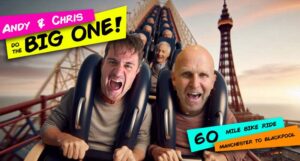Having Usher Syndrome is a rollercoaster of emotions as your vision ebbs away.
Going blind is all consuming so much so we almost lose sight of the real importance of access to sound.
For me going blind took precedent!
I had retinitis pigmentosa and I had macular oedema. My consultant was so concerned about the macular oedema I was given drops, I was given tablets and ultimately I had a small procedure on one of my eyes. I was seen every 3 months for the first 4 years after my diagnosis. I had appointment after appointment, low vision clinic, VI Liaison Officer, this test, that test the list went on and on and it was absolutely exhausting.
To be honest I didn’t really understand it all back then, I had been used to appointments, audiology and speech therapy. Looking back my life had very much been about working with one adult or another on a one to one or in small groups because of my deafness.
However, as time progressed and I matured I began researching retinitis pigmentosa, macular oedema and Usher Syndrome – naturally I began to realise the severity of my condition and over the years I have felt a strange kind of grieving for my sight. I have been sad, I have cried, I have been angry, I have felt emotions I never knew existed, the result of which I found myself feeling very different, very isolated and on occasion very scared of the future.
Whilst we were all dealing with my progressive sight loss the one thing that enables me to be me is my deafness, as strange as it sounds my deafness had become the one thing that could, would and does enable me to live a pretty positive life, but only with assistive technology. There is some amazing assistive technology to enable deaf people.
I was born deaf, I never grieved for my loss of sound, I’d never had it to lose it! I had hearing aids from 18 months old, they could enhance and enabled me to access sound, thanks to those old analogue hearing aids I learnt to speak. It took a time but I was very well supported. The digital hearing aids I got then enabled me to really get going and along with a radio aid I did really well and was able to be as inclusive as I chose. There were difficulties but I had developed coping strategies because deafness and hearing aids were all I knew.
One of the first things I noticed just before my Usher Syndrome diagnosis was that I felt more deaf. I was really struggling to hear, what I hadn’t realised straight away was that my sight loss had denied me the ability to lipread, see facial expression and gestures, things that help enable deaf people to hear, yes, us deafies hear with our eyes. Lipreading is a huge part of understanding and enablement, up to 40% is heard with our eyes, I had lost that.
Looking back now losing the ability to hear with my eyes made my life so much more challenging. I don’t think people realise how tiring being deaf is, always having to concentrate on listening, having to use your sight to access information, its tough, however deafblind is beyond exhausting and sometimes totally overwhelming.
Having Usher Syndrome is truly challenging and painful for the people closest to us, often a feeling of helplessness because so far there is no cure, however there is some incredible assistive technology available. In my opinion we need access to it and we must embrace it to live as positive a life as possible.
Being deaf and going blind is gut wrenching but what many tend to do is concentrate so much more on the blind part of the condition when in actual fact and in my opinion we are missing out on the real importance of our ears.
Much more consideration should be given to our deafness and what hearing aids can do to enhance our lives.
For those following my story I have been fortunate to be wearing GN Hearing smart hearing aids for several years.
My Resound LiNXQuattro smart hearing aids have enabled me to literally fill in the gaps made from the loss of visual clues like lipreading, facial expression and gestures and more. These visual strategies are said to be 40% or more of how deaf people access sound!
Today I hear so efficiently that I no longer miss the visual clues. I can hear around doors, I can hear inside and outside, I have directional hearing, I hear tone and clarity. I have depth in my hearing, I am very fortunate.
Naturally my hearing aids have an app, Resound 3D, it enables me control over my hearing.
I can use my iPhone or applewatch to make adjustments: I can adjust volume settings, mute my hearing aids. Adjust speech focus, noise and wind noise levels. Adjust treble and base to suit. There is a tinnitus manager. There is a help locate lost or misplaced hearing aids. There is a remote audiology assist. The list goes on and on.
I can use my iPhone as a phone thanks to bluetooth connectivity and streaming, imagine life without access to a phone, I had that for 20 years!
Before smart hearing I would switch off my hearing aids whenever I could choosing silence to relax after a busy tiring day, today I relax listening to music, music I can hear, lyrics I can hear and I totally enjoy it, music is so therapeutic.
Without a doubt I’d love to be able to see again but its not happening anytime soon so I embrace as much enabling technology as I can to live a fulfilled life.
My smart hearing aids are the catalyst to my accessibility toolkit and should be made readily available to all hearing aid users living with Usher Syndrome.


